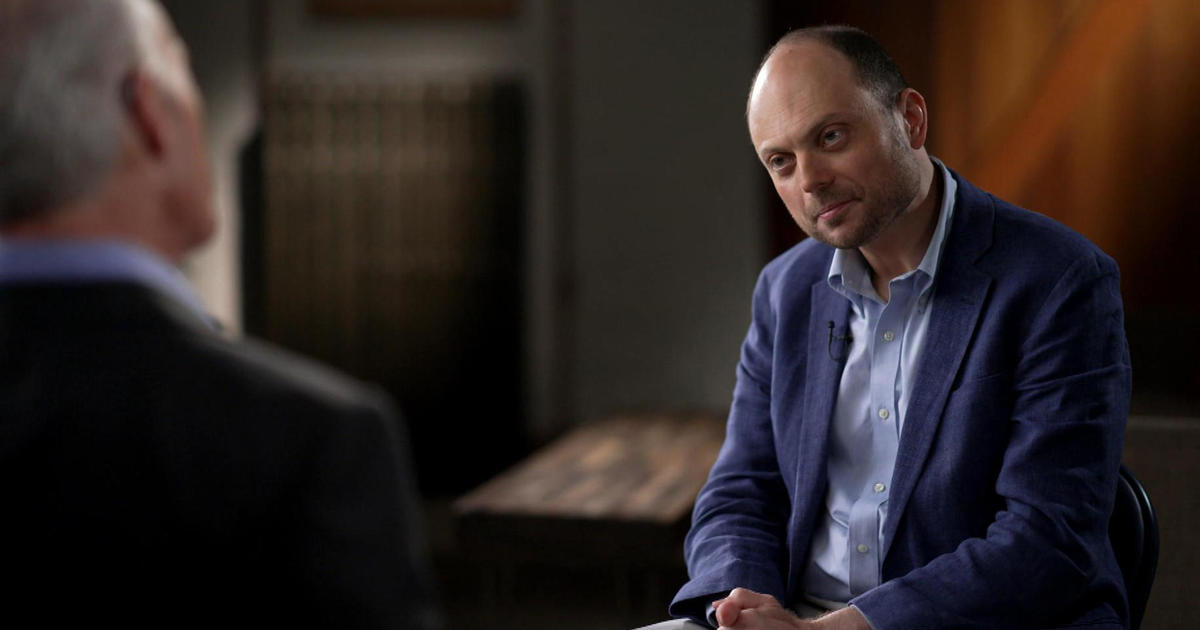When Russian dissident Vladimir Kara-Murza was sent to prison for speaking out against the Kremlin, it was noteworthy that he continued to criticize Vladimir Putin from behind bars, even to the point of winning a Pulitzer Prize for his essays. What is even more remarkable is that the Russians let him correspond with the outside world.
“I was already in there. I mean, that was the goal,” Kara-Murza told correspondent Scott Pelley in an interview for 60 Minutes. “I was in solitary confinement in a strict regime prison in Siberia with a 25-year sentence. What else could they have done to me?”
Kara-Murza was released from prison in August as part of the prisoner exchange with Russia that was negotiated by the Biden administration and its allies. He had been arrested in April 2022 for publicly criticizing Russia’s war in Ukraine and held in solitary confinement in Siberia since his conviction a year later.
Long critical of Putin, Kara-Murza twice survived being poisoned by suspected agents of the Kremlin.
Prior to his arrest, Kara-Murza had contributed columns to The Washington Post, and he continued to write them throughout his time in the Russian penitentiary system. His prison essays included headlines such as “Russians are living in a frightening, distorted reality” and “Vladimir Putin’s war on Ukraine makes a mockery of law.”
Although his public criticism of Putin and the war in Ukraine had earned him a conviction for treason, Kara-Murza said writing behind bars has long been a tradition for Russian political prisoners.
“Many of them actually wrote some of their most significant pieces of work while they were in prison,” he said.
He explained to Pelley how he was able to get his writing out. It began, he said, with an electronic letter system, through which his friends and family would write to him. Guards would then print out those correspondences, along with a few sheets of blank paper for a written reply.
Kara-Murza said his wife, Evgenia, frequently wrote to him and attached the maximum allowed number of blank sheets, which he used to write his columns longhand. He would give his writings back to prison officials, who would then send them through the censorship system before they were electronically delivered back to Evgenia.
Kara-Murza said very little was ever censored. He noted that, at times, he preemptively edited his own words in order to clear the censorship system, knowing his wife would figure out what he really meant.
“She knew exactly what I was actually saying,” Kara-Murza said. “And so, she would just replace a word to make it the one that I was actually meaning to write but couldn’t because of prison censorship. And every time she got it exactly right.”
Kara-Murza in May was awarded a Pulitzer Prize for the “passionate columns” he authored “under great personal risk,” and which included striking datelines such as “PRE-TRIAL DETENTION CENTER NO. 5” and “PRISON COLONY NO. 6.”
Whether he was awaiting his fate in a Moscow cell or being held in solitary confinement in Siberia, Kara-Murza told us no one in the Russian prison system ever prevented him from writing.
“I think for the regime and the Kremlin, what is most important is to punish their opponents, to punish them physically, to isolate them from their families, not to allow them to speak to their children, to send them away into Siberia, to keep them locked up, which is what they did to us,” Kara-Murza said. “What we wrote in letters, I don’t think they cared much about.”
The video above was produced by Brit McCandless Farmer and edited by Scott Rosann.
